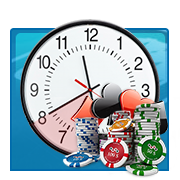Common Poker Tells

Poker tells are things that players do at the table which inadvertently give away the strength, or weakness, of their hand.
Tells can be visual or verbal, ranging from something an opponent says to the way he sits or makes eye contact, or the way he plays with his chips.
While there's no 'one size fits all' solution to spotting common tells, with a little practise you can start to interpret certain physical tics (in a live setting) or looking for specific patterns when playing online. Here, we examine some of the most common poker tells.
Live Visual Tells
Watch the Eyes
If you're playing in a live cardroom or casino, you have a wealth of information available to you as you can see your opponents clearly across the table. If you're facing an opponent who is raising a large percentage of pots, watch their face as they push in another raise. Where are they looking? Down at the table, straight at you, at their cards again?
A good sign (although not definitive) of a strong hand is that the player is staring wide-eyed as they try desperately not to give anything away. They might look at their hand then glance quickly at the player either side of them to make sure no-one spotted them looking excited.
Playing With Chips and Cards

Novices who try to give off false tells will react to a strong bet from an opponent by shaking their head in frustration, playing with their chips as they "agonize" making a call, and constantly shuffling with their chips or checking their cards. Of course, the chips go in eventually and the monster pair is flipped over.
This "false" or "reverse" tell, often used as a "weak means strong" bluff is as easy to spot as an unconscious tell as it's conscious; the aim is to bluff another player by acting weak.
On the whole, though, beginners and casual players won't be using these reverse tells too much.
The Chip Stack
Interestingly, you can spot tells about a player before they've played a hand. How do they sit with their chips? Are they stacked neatly in separate denominations, or are they dumped on the table in a messy pile?
If a player's stack is a mix of small and large denominations (most notably, the big denomination chips are tucked midway down a stack) they might be a sloppy player too, playing a mess of starting hands and having undisciplined betting.
And what is the player doing with their chips in between hands? Are they riffling them like a regular or not touching them at all? A polished riffler can be the sign that they are experienced.
Body Posture

While the eyes give away a lot, body language does too. Players with strong hands will often sit upright with their arms crossed.
As well as the defensive 'arm fold' when holding a strong hand, so players with good hands will sometimes touch their nose or jewellery.
They might unconsciously sit with their hands over their cards, "protecting" them. Again, these are "defensive" signs used by players trying to protect themselves from being found out.
Checking Cards
Texas Hold'em is a game played with hole cards, and, unless a player has a terrible memory, may look at their cards for a variety of reasons.
A player may make up a bet from the small blind with a marginal hand for value and immediately check their cards. The hand wasn't good enough to remember before the action came round to them, but now they're committed to the flop, they'll check the hand to remind themselves what they have to improve upon.
Live Verbal Tells

The beauty of live poker is that you can pick up a lot of information just by talking to your opponents.
Pros like Daniel Negreanu are experts in gleaning information from other players, and it just takes a simple word or two to give away vital clues.
The classic verbal tell is the "please don't call me" quip. "You really don't want to call me" is a classic bluff made by players who want exactly the opposite to happen (unless you're making a reverse tell, of course).
"I'll show you if you fold" is another comment used by players with poor hands who want to induce a fold from an opponent. One other common verbal tell is the "fold interruption". A player raises the pot and you're deliberating calling. He wants a call as he holds the nuts but you've already touched your cards as you prepare to fold. The player interrupts your flow with something, "Are you sure you want to do that?" or, "Think of all that money you could win."
The verbal action is meant to disrupt your flow and induce you to make the call.
Online Tells
Spotting tells in your opponent when playing online is much harder, for obvious reasons: you can't see the other players (unless you're playing at one of the new webcam-poker sites) and the only verbal exchanges will be via the on-screen chatbox.
But that doesn't mean you can't glean information from your online opponents. Here are several common online tells you can use to add to your arsenal.
Running Down the Clock

The time it takes a player to make a decision is perhaps the biggest online tell you can spot.
Most casual online poker players aren't good at disguising their range of hands, and if they're taking 30 seconds or more to make a decision, you can use the time to put them on certain hands.
Of course, be careful that the player doesn't have a habit of running down the Time Bank when slow-playing the nuts and milking his "painful decision". In any case, use the on-screen Player Notes to mark up players who use the clock to make tricky decisions a lot. (Even use the Hand Histories after if you have to.)
The Quick 'Check/Fold'
With online poker, you can choose your move in advance via the 'Check/Fold' box. This can be selected if you've decided that your hand is marginal at best and you will check if you can, or fold if anyone makes a bet.
While selecting the option is good to save time, especially if you are multi-tabling and need to make several decisions at once, a quick check by a player is often a clear sign their hand is poor or marginal.
Try to get into the habit of not pre-selecting your move if possible as canny opponents will soon pick up on it.
Chatbox Chatter
While you can't 'hear' your opponents trash-talking or discussing the previous hand when playing online, some players do like to use the chatbox.
If you're in the middle of a tournament, and one or two players are typing a lot of chatter in the chatbox, turn off the 'Dealer summary' option and try to follow the conversation. If a player who's been particularly verbose up till now suddenly goes quiet it could mean he's deliberating how best to play the nuts.
Meanwhile, a previously-quiet player might start typing all kinds of nonsense in the chatbox to distract opponents and disguise the fact he's playing the nuts.
Giving Off False Tells

Spotting tells is just the first step in good poker psychology; you have to be good at giving off false tells too.
False tells are designed to throw players who are paying attention to your body language.
By being consistent and always doing the same thing whether you have a bad or good hand is great for "telling a story".
For example, if you know that crossed arms and sitting up straight is a sign of a strong hand, then utilise this pose whenever you have a bad hand. False tells are perfect for strengthening your bluffs and making sure you take down more pots.




